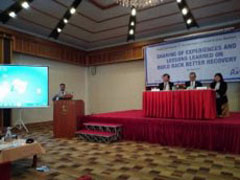April 26, 2019
On April 26, 2019, the 4th Earthquake Commemoration Seminar, "Sharing of Experiences and Lessons Learned on Build Back Better Recovery," was co organized by the National Reconstruction Authority of Nepal (NRA) and JICA in Kathmandu. More than 150 participants from the government, donor organizations, citizen groups, academia, media, etc., gathered to discuss the current status and future issues on disaster recovery four years after the 2015 Nepal Earthquake, and, in addition, shared knowledge on Japan's disaster recovery.
NRA's presentation emphasized the steady progress of recovery in each sector over the past four years, with a progress rate of approximately 80% for housing reconstruction, 85% for school reconstruction, and 66% for health facility reconstruction.
Following NRA's presentation, Dr. Kozo Nagami, Senior Representative of the JICA Nepal Office, explained how the fundamental principle of "Build Back Better" (BBB) was realized through Japan's support on earthquake recovery. Dr. Nagami also explained that the realization of BBB requires, not only reducing disaster risks and strengthening resilience, but also reducing not only physical, social, economic and cultural vulnerabilities, including environmental and organizational vulnerabilities. On that basis, Dr. Nagami emphasized that JICA's recovery support in various ways has been finally bearing fruit after four years, taking into account the multifaceted vulnerabilities.
Furthermore, this 2019 seminar welcomed two special guests from Japan to share knowledge based on their own experiences on earthquake and other disasters. First, Mr. Shu Oyama, Deputy Mayor of Higashi Matsushima City, Miyagi Prefecture, presented his City's experience and the lessons learned about recovery from the Great East Japan Earthquake that hit the Tohoku Region in March 2011. In particular, Deputy Mayor Oyama deliberated on the importance of consensus building among the residents of his city in the recovery process as the result of such a participatory decision making process. Many residents participated in the city's reconstruction planning, and such activities could also be important in the future reconstruction activities in Nepal.

Deputy Mayor Oyama and Prof. Nishikawa responding to questions from seminar participants.
Lastly, Prof. Satoru Nishikawa of Nagoya University, a leading expert on disaster risk reduction, presented the history of DRR in Japan, in which the Disaster Mitigation Research Center has continued to make efforts to enhance the DRR capacity every time natural disasters occur. Prof. Nishikawa also presented a case study in Japan, showing that even if the risk of disaster is high, it is possible to minimize the damage by repeated pre disaster investing in resilience to reduce vulnerabilities. Many participants listened to the presentation with great interest.
In this seminar, it was strongly emphasized that continuous efforts to post quake reconstruction by promoting long term investments for DRR and strengthening the resilience of the entire country will also contribute to the long term development of Nepal.
The speakers from Japan received questions from many participants even after the seminar, and it was reconfirmed that reconstruction by the BBB and the strengthening of resilience are important issues for Nepal's country building activities.




scroll